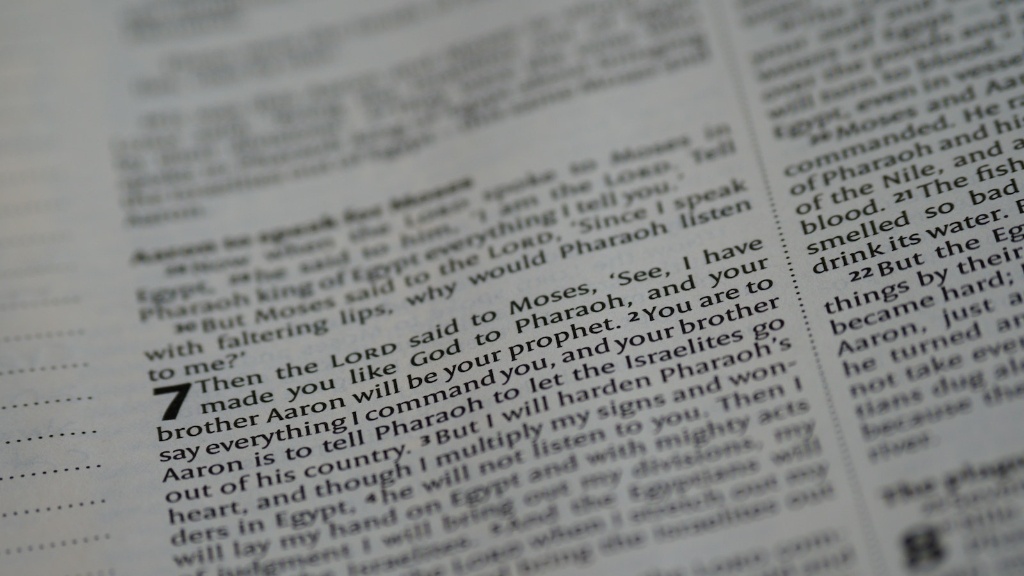The Bible is an important sacred text for religions like Christianity and Judaism, and amongst its many stories there is a tale of the 10 plagues of Egypt. The story is known as the ‘Exodus’, and it describes how the Jewish people were freed from slavery in Egypt by the actions of Moses. It is often said that the 10 plagues were the judgment of God against the Pharaoh of Egypt, who had enslaved the Jewish people. In this article, we will explore the 10 plagues in more detail, and examine why they are seen as an important part of biblical history.
The first plague was the turning of the Nile River into blood. It is believed that Moses and Aaron, through the power of God, transformed the Nile River into blood, making it impossible for the Egyptians to drink or bathe in it. The Nile was an integral part of life in Egypt and it’s said that this plague caused widespread misery and suffering. The second plague was an infestation of frogs which took over all of the land, polluting water sources and bringing disease and pestilence. The third plague was gnats, which were another form of pestilence, and fourth was a massive swarm of flies that descended upon the land. This plague was particularly destructive as it destroyed crops and caused a great deal of suffering.
The next plague brought animal misfortune. All of the livestock in Egypt suddenly began to become ill and die. This caused a great deal of financial hardship for the people of Egypt, as their livelihoods had been wiped out. The sixth plague was a terrible outbreak of boils, with the seventh plague of hail destroying what crops and livestock hadn’t already been destroyed. The eighth plague was locusts, which devoured anything that hail had left in its wake, while the ninth plague was darkness which covered the land for three days. Finally, the tenth plague was the death of all the firstborn children in Egypt, a terrible punishment inflicted by God in response to Pharaoh’s refusal to release the Jewish people.
The Significance Of The 10 Plagues
The 10 plagues of Egypt have been mentioned many times in the Bible and are seen as one of the most important stories of the Old Testament. According to the Bible, God used the 10 plagues to demonstrate his power and to send a message to the Pharaoh of Egypt that he must follow his dictates if he wishes to be spared from judgment. They also demonstrate the importance of following morality and justice, as God chose to punish those in power who chose to oppress others instead of protecting them.
The 10 plagues are also referenced in the works of other ancient cultures, including those of Mesopotamia and Persia. This suggests that the account of the 10 plagues was not just a story told by the Hebrews, but that it held a universal significance for ancient cultures. This universality serves to further reinforce the importance of the 10 plagues as a sign of God’s might and a reminder to all that justice and morality should be valued.
Furthermore, the 10 plagues are a sign of hope for oppressed peoples today. They symbolize God’s willingness to stand up for those without a voice and to take action to protect those in need. It’s no coincidence that many modern movements for justice and peace around the world use the 10 plagues as an important rallying cry.
The Relevance Of The 10 Plagues To Christianity
The 10 plagues of Egypt are a significant story in Christianity, as they represent God’s judgment against Pharaoh and the freeing of the Jewish people from slavery. The 10 plagues are often seen as an example of God’s action in response to injustice, and they are used to emphasize the importance of treating others with respect and dignity. The plagues also demonstrate God’s power to intervene in human affairs and they create a strong link between God and the Jewish people.
The 10 plagues are particularly relevant to Christians as they are a reminder that Jesus was born as a Jew in order to save mankind from its sins and bring peace and justice to the world. The 10 plagues also serve as a powerful illustration of the idea of grace and redemption, as even though Pharaoh and the people of Egypt had sinned, God was willing to forgive them if they repented and followed his commands.
Overall, the 10 plagues are a significant part of the Bible and have been interpreted many different ways over the centuries. They serve as a reminder of God’s power to protect his chosen people and call justice and mercy into the world. They also serve as a powerful symbol of God’s love and grace, and his willingness to forgive even those who have sinned against him.
The Historical Perspective Of 10 Plagues
While it is undoubtedly accepted that the 10 plagues of Egypt are a significant part of biblical history, there is still some debate as to the veracity of the account. Some historians argue that the 10 plagues were likely a combination of natural events such as floods, earthquakes and droughts, that served as a means of preserving the narrative for future generations.
Moreover, some argue that the 10 plagues could have been exaggerated by later generations in order to emphasize God’s power and influence over the world. While other scholars contend that there were 10 individual plagues that were physical occurrences, as opposed to metaphorical ones. Despite the debate, most scholars today agree that the 10 plagues are a significant part of biblical history and no matter the truth behind the events, their narrative remains an important part of biblical literature.
Symbolism Of 10 Plagues
The 10 plagues of Egypt have also been interpreted symbolically in both Christian and Jewish traditions. In Christianity, the plagues are seen as symbols of God’s punishment of sin and of his willingness to intervene on behalf of the oppressed. Some theologians also view the plagues as a representation of the seven deadly sins and the consequences of indulging in them. In Judaism, the plagues are seen as a reminder of the events that took place in Egypt and the exodus of the Jewish people from slavery.
The 10 plagues have also become significant symbols of liberation in modern culture. For example, the civil rights movement in the USA sought to emulate the ten plagues, standing up against oppression and seeking justice for the oppressed. Similarly, the many liberation movements around the world, such as the fight for Palestinian independence, often cite the 10 plagues as a symbol of hope and a reminder of the power we all have to stand up for those without a voice.
Modern Interpretations Of 10 Plagues
Modern interpretations of the 10 plagues can vary greatly, and often depend on the reader’s individual religious beliefs and background. Many Christians are likely to interpret the 10 plagues as a sign of God’s judgment against sin, while Jews may view them as a reminder of the oppression of their people in ancient times. Atheists may view them as simply fiction or an exaggerated account of natural disasters, while those of other faiths may see them as a symbol of hope and liberation.
Regardless of how one interprets the 10 plagues, there is no denying the fact that they remain an important part of the Bible, and represent a significant story of liberation and justice. They are a reminder that God is willing to stand up for those without a voice and that we must not become complacent in the face of oppression and injustice. The 10 plagues should serve as a reminder that we all have the power to speak out and stand up against injustice and inequality, no matter our religious beliefs.



